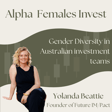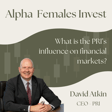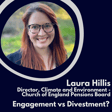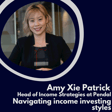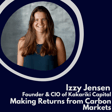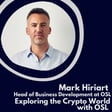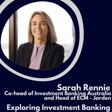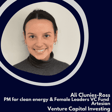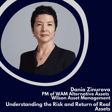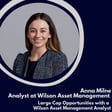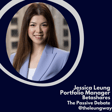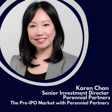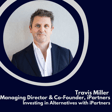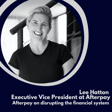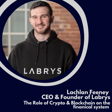Introduction and Podcast Focus
00:00:04
Speaker
Welcome back to the Alpha Females Invest Podcast, two females working in the finance industry searching for alpha. My name is Emily. And my name is Clooney. And together we bring diversified perspectives from the buy and sell side of the finance world.
00:00:19
Speaker
Our mission with this podcast is twofold. We wanted to create content for listeners who are beyond the intro to finance podcasts. Maybe you work in the finance industry or perhaps you're already really engaged with the markets or investing. We hope we can skip the basics here and dive in for some meaningful and slightly more technical conversations. Our second and equally important mission is to help elevate female voices in the industry.
00:00:44
Speaker
The podcast content is aimed at all genders. However, we wanted to provide a platform where we can interview equal numbers of males and females to expose you to the diversified voices out there. And also, just before we begin, a quick disclaimer that anything mentioned here are the views of the individual and it is not considered financial advice. You should always read the PDS before investing in a financial product and talk to an advisor who can take your personal circumstances into account.
00:01:11
Speaker
So today we have Nick Varko joining
Guest Introduction and ESG Overview
00:01:14
Speaker
us. Nick is a fruitful character in the ESG equities industry and actually pushed us to start this podcast. So given the three of us have a pretty deep career crossover, I'm sure this will be a very interesting conversation on whether ESG investing is just a fad. And don't worry, we won't be going easy on the tough hitting questions.
00:01:35
Speaker
So, a little description of Nick's background. He is the head of ESG at Paradise Investments, which is a boutique investment manager established back in 1999, and they use fundamental stock picking to generate returns for their investors. Prior to Paradise, he actually worked at another large active manager, Ausbill, where one of their funds was named the 2020 Lonsack Sustainable Investment Award.
00:01:58
Speaker
Interestingly though, Nick's background was in the Royal Australian Artillery in the Australian Defence Force, so basically he got to shoot guns for a living. Unsure if relatable equity investing content, but maybe some of these skills are transferrable, I'm sure we'll find out. I'd definitely like to look at the ESJ concepts of being in the Army, definitely later on in the podcast. Interesting to know if you have any exclusions on weapons.
00:02:22
Speaker
Hi guys, thanks for having me. So Nick, to start it off today as we like to do with each and every podcast we've started to record, can you give us a little bit about your most embarrassing career moment? Yeah, it's an interesting one to start on and I don't know if this is embarrassing but it's definitely something that left a mark on myself and I think that was probably my technical illiteracy on joining the industry.
00:02:43
Speaker
As you mentioned, I had a fairly non-conforming background, at least here in Australia, having spent a brief period of time, I'll add, in the Defence Force. And so there I was, the young, fresh uni student who could barely use Excel and had no idea how to use Outlook. It might not be embarrassing to some, but I remember at the time on my first day actually being asked to set up a meeting in Outlook and completely bungling it.
00:03:06
Speaker
and then being asked to pull something together in Excel and sitting in the office watching a YouTube video. I remember going home and even asking my girlfriend, sorry, asking me how my day was and I felt way out of my depth and not in something that I thought I'd be out of my depth on, not exactly a highlight of my life. However, I guess, thankfully, whilst important, there's a bit more to investment space than Outlook.
00:03:29
Speaker
So I'm glad to hear it's been up and beyond on the investment outlook. I'm also confused as to why you've never opened the outlook before.
Role and Communication in ESG
00:03:38
Speaker
Did they not have email at the army? Yeah, no, that's a good point, but no, not really. Fair enough. High security, love that. Reduced cyber security risk. So tell us what even does a head of ESG role involve? I mean, you're obviously looking at different funds, how are your KPIs assessed and what really determines ESG and sustainability in your investment process?
00:04:00
Speaker
Yeah, and I think it's a really good point in ESG itself. There's a lot of confusion around where you fit in an organisation. For myself, it really breaks down into two key parts I see it. The first being the investment integration, which I'll touch on a bit, and the second being that internal integration piece. So on the investment side, it's increasing, and I like to think of it as increasing the understanding of our investments.
00:04:22
Speaker
We take a broader look, as I like to think of it, of the risks and the opportunities that are involved in our investments and then integrate this information into our holistic investment decision. To do so, on that investment side, we've got three key tools at the moment. The first is a broad-based engagement framework. The second is a specialised tool around climate change, clearly an important issue and I'm sure one will touch on. And then the third is one around modern slavery. This is also
00:04:49
Speaker
very heavily integrated in the concept of active ownership, so things like assisting on proxy advice, collaborative engagement in groups with the Climate Action 100+, for example, on climate change, believe it or not, investors against slavery and trafficking, so the IAST, things like policy engagement with the government. There's been a couple of points here in Australia in the last year or so. We've had more recently proxy advice, and then before that there was a virtual AGM collaboration. And then also reporting frameworks like the PRI.
00:05:16
Speaker
And then I guess the last part there would be assisting in the communication of what we're doing on the investment side. That's probably something that's underappreciated or underestimated. Clearly as the industry rises, there is more information that needs to be shared and accurately and efficiently communicating that information to clients is a really big part there.
00:05:35
Speaker
So Nick, given I'm not from an ESG background, I always find it interesting the different types of procedures that different funds go through. Yes. I assume your procedure is quite different from a lot of other fund managers out there, would that be correct?
Evolution and Integration of ESG
00:05:48
Speaker
Yeah, and maybe that's an interesting point to give a little bit of the history or the broad range of ESG. It sort of stereotypically got its background in negative screens or an exclusionary process that came out of religious institutions mainly. This was, we're talking decades ago here. And to make the point there that was more aligned with values and ethics and they were happy to give up returns in most cases by a simple negative screen.
00:06:11
Speaker
This evolved into socially responsible investment and then more recently into the concept of ESG integration and impact type strategies. These strategies are now more focused on alpha generation, which we've already spoken about, or aligning themselves with impact goals such as the sustainable development goals. Impact has historically been a private markets type endeavour.
00:06:32
Speaker
But with things like the Sustainable Development Goals, we're seeing it more rapidly shift into the public markets. Confusingly, though, and to your point, they're all still around and all sit under the banner of ESG or sustainable investment. Yeah, it's a good point. And there's many different approaches out there as are there many different types of
00:06:48
Speaker
investment processes and styles. I was in a meeting with some institutional investors a few years ago talking about executive remuneration and how we thought that ESG metrics should be integrated into remuneration structures and we had an investor, someone you know quite well, say well shouldn't they just be doing it anyways in that part of their job? So how much of ESG and sustainability is just good investment decisioning and how much is it a separate style?
00:07:18
Speaker
I guess there's a couple of points here and there. On the first, on remuneration, I think measurement begets performance, which is a classic Charlie Munger, a paraphrasing of Charlie Munger, and I think that that is important. I guess more broadly, I would consider appropriate ESG risk management to be fundamentally part of building a sustainable business model.
00:07:41
Speaker
I think the industry is very focused as you both know on valuation and improving the sustainability or the quality of those earnings is clearly reflected in multiples. So I think it's really important and I think maybe the point that you're trying to get at or the point that I'm trying to get at is that it is integral. It's just by focusing on some of these metrics that have maybe historically been underappreciated. I think that there is a difference that can be made. Yeah, I love that and I definitely agree.
Key ESG Themes: Climate and Slavery
00:08:07
Speaker
So give us a little background from your perspective, what's really been happening in the sustainability space in the last 18 months. Are there any key themes that you're seeing continue to develop over time or new themes that you're starting to see sort of bubble to the surface? What's your view on the space right now?
00:08:23
Speaker
Yeah, so I think probably the obvious one would be climate change. It's continuing to ramp up, we're seeing more and more disclosure. I think that the recent reporting season, I think now 40% of the ASX 100 now has a carbon neutral or similar goal by 2050. Wow, I didn't know that.
00:08:38
Speaker
Yeah, so that's good to see, and it's rapidly evolving. A lot of the active ownership and engagement we do is around making sure that companies are adequately prepared for what we see as the future. And interestingly, that evolving piece around climate change is also bringing back things like carbon footprinting. Remember back in, I think, late 2018, it was a really big thing that was coming through.
00:08:57
Speaker
However, at the time there were real issues with data quality, which are still there. They haven't gone away, but we are definitely becoming more comfortable as both the disclosure quality increases globally and also the estimation techniques are also coming up the curve. The other point would probably be around modern slavery. And can you just define that, just given I don't have an ESG background, obviously I know what ESG stands for, but modern slavery, what do you really mean by that and how do you characterise that?
00:09:21
Speaker
Yeah, so modern slavery has really come to the forefront here in Australia with the Australian Modern Slavery Act. That was passed, I think one gen 2019 or roughly around then. However, the implementation of that act was actually pushed back with COVID, but it was 31 March 2021.
00:09:36
Speaker
So the Act defines modern slavery to include eight types of exploitation. So that's trafficking in persons, slavery, servitude, forced marriage, forced labour, debt bondage, deceptive recruiting for labour services and child labour I think is the final one there.
00:09:52
Speaker
So really it's a broad take on what slavery and all of the forms of slavery that it can take. And how does that sort of relate to, I guess, the investment process in companies? Can you give us an example of what would be modern slavery, you know, I guess, besides being paid under the minimum wage?
00:10:07
Speaker
Yeah, no, and I think for me, modern slavery is probably one of the clearer ties into fundamental earnings and earnings quality. A business that relies on an unsustainable cost base in their supply chain is inherently an unsustainable business. And modern slavery, we believe, is unsustainable. So that is clearly something that we want to be aware of and something we want to be taking into account when we're making our holistic investment decision. Generally, in Australia, businesses have exposure to supply chains all throughout Asia.
00:10:37
Speaker
There's 40 million people in modern slavery in the world as the numbers that are generally accepted and of which a large proportion are in Southeast Asia. So what that can look like is people that are in debt bondage, for example. There's recently been a fair amount of noise around the Malaysian single-use glove manufacturing industry. US Customs and Border recently sanctioned a company and actually enforced restrictions on the goods being imported into the US on a company called Top Glove that was based in Malaysia.
00:11:06
Speaker
And clearly there is then revenue implications if you can no longer export your gloves to a certain geography. There is also the cost impact by paying your workers more. And I think the stats that I saw was that they actually done a complete flip in their employee base. So they went from 20% full time, 80% contracted to they are now roughly 90% full time, 10% contracted. Wow. So that's a pretty big impact on a company overnight almost.
00:11:32
Speaker
Yeah, incredibly big. If you're sort of getting that double whammy on both sides, clearly it's meaningful. So modern slavery for us is something that we do look at and we've actually built an in-house tool to look at that. So we take revenue and supply chain, so getting both sides as the Malaysian example highlights, taking both sides of that on a geography basis and then reconciling that with a number of high risk geographies and reconciling our exposure to our companies and those higher geographies and then engaging off the back of that. And we've had success
00:12:01
Speaker
and spoken to a number of companies around the processes. And so that was my next sort of question. Are companies engaging with you on those conversations and are they happy to release that data to a degree? Yes, certainly. I mean, it's more around more to a broader point around these tools, as I like to call them, that we've put in place at Paradise. It's around putting, I guess, logic and structure around the questions that we can ask. I'm sure we've all been in meetings when you've asked a question and the management's batted it back with sort of
00:12:28
Speaker
Straight back, no real detail. Yeah, just sort of pretty wishy-washy. But if we can sit there and say, look, this is our process, this is our logic, if you agree with every step of the way, can you tell me why the result is something that I do or don't need to be concerned about? So it's been really helpful in that aspect.
00:12:43
Speaker
Yeah, that's great. And I guess like an example that I can think of, an offshore example, and a company that probably some of our listeners are familiar with, Boohoo. They had some living wage concerns in their supply chain. The stock plummeted, I think it was over 40% on the day that that broke out in the news.
Engagement vs. Divestment in ESG
00:13:00
Speaker
What happens with a company that you hold that might have evidence of modern slavery in their supply chain? What's the next step? How can you remediate that?
00:13:09
Speaker
Yeah, and I think it's a good point and one that's probably a little bit misunderstood. The reality is that best practice is rarely to cut the offending supplier. That's generally thought to be ineffective at solving the issue. It's a little bit like the engagement versus investment question that we run into in ESG more broadly. Just to be clear, it's generally the second or third tier supplier to the company. It's almost never the actual company is underpaying. Clearly, we've had some underpayment issues here in Australia, but they wouldn't be defined as modern slavery. That's more
00:13:38
Speaker
sort of not being paid appropriately, I guess. But what we're looking to do is continue engagement with these offending suppliers and make sure that there is a program of education and assistance to solve the root issue. I assume that sort of solves the issue then across the board, right? You start with one company that's a supplier to X company, they also supply to A, B and C. Yes. So if you solve the issue with X company, I assume those processes can be implemented across the board.
00:14:01
Speaker
Yes, and there's a range of strategies as well that we share with companies. Part of this active ownership part is sharing best practice with the companies we invest in and things like consolidating supply chains so you have more impact and you can engage better with your suppliers is something that we do focus on and do recommend.
00:14:18
Speaker
Just that final point though is clearly there is a stage where engagement is not working and divestment is on the cards so having the stick only works if you're willing to use it and sometimes that is necessary and there's been companies that we've spoken to, large ASX20 companies that have happily taken that measure if the company they're engaging with isn't fixing.
00:14:38
Speaker
That's interesting. So we've obviously focused a fair amount on modern slavery which has been quite interesting and I guess we don't realise how much of the products we use every day could be exposed to modern slavery somewhere along the chain. But taking a little step back, I mean,
00:14:53
Speaker
You know, a lot of pushback comes on, is ESG overrated? Is it just a fad? Is it something that's going to go away and, you know, just kind of a bit guess, you know, in vogue now? How do you consider that and how would you answer pushback in that space? Yeah, I mean, there's a number of points there, I guess. I think it really depends on how and what you think ESG is. Clearly, as I step through before, it's evolved over the decades.
00:15:21
Speaker
And I think the fact that a lot of these stacked, so you had parts of ethical parts of socially responsible, et cetera, et cetera. And I think that when something is so emotional, it's really difficult to overestimate. However, from a alpha generation perspective, I think.
00:15:35
Speaker
things are happening now that are making it clear that this is impacting returns. Tobacco is a pretty interesting example historically there was this sort of maybe not widely held belief but that you would be offsetting your PED rates through a div yield increase right these businesses were still spitting off cash clearly however I think that data is from about 2017 that's actually not been the case and you have been negatively impacted from the PED rate as people are prepared to pay less future cash flows.
00:16:01
Speaker
Yeah, it depends on how you look at it, but the valuation is relatively clear from my perspective. We're trying to buy high quality businesses and ESG is one part of buying high quality businesses. Yeah, no, I absolutely agree and I've told this story a few times, but I always got told that when there was, you know, a global financial crisis, the ESG person would be the first person to be made redundant and how that's changed since the COVID pandemic where we saw markets react the way they did and ESG became even more important.
00:16:30
Speaker
So yeah, it's just a really interesting conversation. And I guess how people's mindset are changing. And there are still some people who push back and kind of see it as a bit fluffy, but I think there's so many cases of where it's generated better returns from focusing on sustainability. And pretty much if you look at any report from RIA, which is the Responsible Investment Association in Australasia, you can see that
00:16:52
Speaker
across pretty much every time frame and asset class, responsible investment funds in Australia have outperformed their mainstream peers. So it's not something that's just fluff. I think it has real benefits for investors when people are thinking about sustainability in their investment decisions.
00:17:09
Speaker
So playing devil's advocate a little bit, I guess obviously Nick you just spoke to companies having a PED rate from not having sustainable practices and you just spoke to how much obviously this is really gaining traction and is something that we should be thinking about. Do you think then at this moment in time we are paying a premium for ESG focused stocks or ESG centric stocks I should say, you know companies that are really focused on all aspects and are doing extremely well in those aspects
ESG Stock Valuation Debate
00:17:37
Speaker
should we be paying a higher price for them versus the average Joe that's not necessarily implementing the right structure? Yeah, I think that's interesting. And there's the example, the one that springs to mind would be the European renewable energy stocks have had some very strong share price movements recently as people were happy to get in and then get out. Some of the ETF flows have been throwing around a number of stocks as well. New Zealand's seen some of those fall fairly rapidly.
00:18:04
Speaker
I think maybe for ourselves if we separate ESG as a concept back to what we're actually looking at when we say we're looking at ESG, which is in a lot of the time the risk, and I use risk being both upside and downside identification, which then drives engagement to better understand that risk.
00:18:21
Speaker
And that increased understanding, I don't think that can be a negative thing, generally. And as I sort of touched on before, one of the pillars of my belief on ESG is that in a market that's constantly thinking about valuation, as we increase the sustainability or quality of those earnings, they get pushed out. And are we happy to buy businesses as those earnings solidify into the future? I think that there can be outperformance that are generated from those re-rates, both on the upside and on the downside, as you rightly highlighted.
00:18:48
Speaker
And do you think that takes a certain period of time? Do you think it's something that, you know, tomorrow everyone wakes up and goes, ESG is necessary, we're derating XYZ and we're re-rating ABC? Or do you think it's something that is a return premium over the longer term, over a three to five year time horizon that is then put into practice?
00:19:06
Speaker
I mean, I can definitely start and Nick, maybe you can add on, but I mean, the market as a general does look to be fairly full. So it's not just ESG stocks. I mean, there's a whole bunch of sectors that are pushing pretty punchy multiples now. But also if we look to Europe and what's happening there, they're so far in advance.
00:19:23
Speaker
in their flows, in their funds, in their sophistication. If you compare that to the Australian market, it's really just at the beginning. So if we think it's the inflows that's causing these ESG premiums, we've probably got a long time to go before Australia catches up. And so you're going to continue to see those prices go up in my view. So really, the stock looks cheap.
00:19:42
Speaker
I think it's a good point and if we take that one step further, it's generally held that America is slightly behind the rest of the world in looking at these aspects and if we think that Australia is going to make an impact in the financial behemoth that is America, coming on board in a big way will be really interesting and there's been a fair amount of
00:20:00
Speaker
regulatory noise in the SCC is obviously getting more involved in what this means and there was a bit of regulation there around if pension funds over there are able to look at ESG metrics. So as that sort of shapes up and Biden's clearly beating his chest around the issue, I think we'll see this happen more and more. I don't think it is fleeting. I think that we've come far enough now that it seems fairly entrenched, would be my view.
00:20:23
Speaker
Yeah, it's interesting. And I guess when we're looking at sustainability, a word that commonly comes up is materiality. And I guess the concept is that not every ESG factor is relevant for every single company. Can you talk us through how you think about materiality and how that applies to ESG investing?
00:20:42
Speaker
Yeah, no, it's interesting. I was reading a blog post by the CEO of the SASB, which is the Sustainability Accounting Standards Board over in America. And the title was the word that launched a thousand ships, which I thought was fairly interesting and probably pretty close to the truth because you're right, because it is a really decisive point.
00:20:58
Speaker
I think the problem facing the world is that materiality as a standard financial definition has been around in the US for nearly a century, and SASB is more focused on financially material information, whereas something like the GRI, which is another BSG reporting metric,
00:21:13
Speaker
is focused on topics that have a direct or indirect impact on an organisation's ability to create economic, environmental and social value, I think it is, which is clearly a broader definition. To me, materiality is information that would influence an investor.
00:21:29
Speaker
or a reasonable investor, however you want to measure that. Clearly the point being is that all investors are different and everyone looks at ESG very differently. I think personally that the information that's bucketed in ESG is decision useful. I think that there are metrics in there that do influence decisions and I think that's probably where the investing edge is determined.
00:21:50
Speaker
So something I think that's probably gotten a little bit of air time recently, you mentioned sort of climate change before, but really more around carbon and the Paris Agreement. Can you sort of break it down for us? I know for one, I definitely don't really understand that in great detail.
Paris Agreement and Climate Risks
00:22:05
Speaker
So if you could just break it down for us and I guess tell us how you can actually invest in that kind of thematic and you know, the impact that that is going to have going forward.
00:22:14
Speaker
Yeah, so the Paris agreement to sort of sceneset is a binding international treaty on climate change. 196 parties in COP21 in 2015, I think it was. The goal is to limit global warming to well below two degrees, preferably one and a half degrees, and every five years they have, I think it increases every five years the sort of action that will be taken.
00:22:35
Speaker
Climate change as a whole is really, really interesting. I think it's probably the largest investment thematic that the world will have ever seen simply because it's so broad and impacts every single sector from traditional energy generation through to consumption and waste management. We're seeing a lot of stuff in that space, which is very interesting.
00:22:53
Speaker
We think about this and we do a lot of thinking about this. I do a very large amount of thinking about this and really what that means is that I break down climate change into sort of three different metrics. The first of those is the regulatory impacts from a transition to a low carbon economy. Traditionally, that means you're looking at things like carbon prices, you've got a carbon border adjustment mechanism or CBAM.
00:23:15
Speaker
over in Europe that they're throwing around. You've got a variety of carbon prices here in Australia. The ones here in Australia are voluntary. The price is about 19 bucks at the moment. It's over in Europe. It's a non-voluntary type scheme and as such the price is whipsawing but is about 40 euro at the moment.
00:23:32
Speaker
So I do a lot of thinking around, okay, well, what do scenarios look like? And scenarios is a big word that gets thrown around in the climate change conversation. But if we have various regulatory reactions to climate change, there will be a corresponding or inversely correlated carbon price as that gets thrown around. And on the back end of that, you can suspect that physical climate change will likely decrease if we take quicker action now. So you can see that sort of inverse correlation.
00:23:58
Speaker
So what does that mean in practice? It means looking at businesses and business models and seeing how carbon intensive they are and their ability to deal with change. That's everything from running a carbon price on the carbon output and looking at the P&L impact through to if they can pass that through, right? That's obviously the next step of the conversation.
00:24:15
Speaker
things like airlines or steel are all quite carbon intensive and all have various elasticities of demand around that. And then we're looking at physical climate change risk which is longer but I think as with most things I think we underestimate the long term and I think that there are currently businesses that are based on building assets for whether they be houses or developments or factories in areas that do face significant physical climate change risk. And housing development's really interesting I think at the moment you're looking at
00:24:45
Speaker
this dislocation between insurance providers and mortgage providers. And the reality is that an insurance provider is generally done on a yearly basis, whereas a mortgage provider is a sort of 10 or 20 year mortgage. And if the insurance provider pulls out of an area, then the mortgage provider is left holding an asset that will have undoubtedly decreased in value if you can't insure it. So those sort of conversations, I'm sort of getting a little bit in the weeds here. So it's all about transition risk as well, or are you talking physical risks?
00:25:09
Speaker
actually can you even define that for our listeners? So the first part I guess would be that regulatory piece around carbon pricing, the second part would be around the physical climate change risk impacting certain areas and I think the third risk which is maybe not as easy to identify or rate would be management's ability to deal with these risks and again the sort of underlying theme to our approach is engagement and active ownership and understanding management. I think it's
00:25:34
Speaker
sort of undoubtable that are competent and aware and a management team that has an ability to react to these situations is going to deal better and we'll be able to manage this risk a lot better. And there's still some climate deniers out there and I'm assuming whether they publicise it or not, some of the CEOs are probably climate deniers as well. So having that conversation and even trying to educate them on what that could mean for their business. And I guess that ties into a conversation of whether you can even have impact in investing
00:26:02
Speaker
in a sustainable way. Are you actually able to make change? Is Paradise as a responsible investment manager actually able to move the markets because of their weight of capital or does it go down to meaningful conversations?
00:26:16
Speaker
Yeah, and I think there's a variety of methods we use. We do and I can tell you confidently that we have had impacts on companies that we invest in. However, I think there's a term called greenwashing and that sort of has relatively negative connotations, but on smaller companies I can see as having a larger impact clearly. There are small mining companies as an example that have had
00:26:35
Speaker
they just don't have the people to look at these things appropriately. If we can get in there, share best practice and have that conversation, there is tangible benefit for that. On the larger companies, they do have the resources to look at this themselves. And although we are quite large in the Australian market in terms of funds under management, that's where things like collaborative engagement comes in. We're a member of Climate Action 100 plus, investors against slavery and trafficking and all these groups. And that just helps, A, increase the weight of the message we're sending, but B,
00:27:02
Speaker
ESG, there's a lot of different things going on and it's about spreading yourself. And if I can add my weight to something I find important, but don't have the time to get on top of in the detail that's necessary on some of these issues, then we can be part of a collaborative working group where we can pull resources and still achieve the result we're after. So I do think that there is, and I think that the things like that 40% of the ASX, that that I think is in part at least, and I'm very hesitant to say it's as a result of,
00:27:31
Speaker
But it is in part, I think, a reaction to extensive engagement from asset owners and asset managers. Isn't it fantastic that it's a collaborative, I guess, environment where ESG members from all different competing firms actually come together for one solid purpose and that's to improve sustainability, whether that is modern slavery, climate change or anything else, and they work together and they're competitors. So it's great that it's a collaborative space.
00:27:57
Speaker
I think what I'm learning about most just through this is that it's really more about an education piece. It's really about educating companies, management, other people in the industry about the benefits of this. And what I thought was really interesting, Nick, was not necessarily slapping them on the wrist and saying, we're not now investing in your company, but hey, let's work together and let's build a way forward here that is sustainable. And the right type of governance is involved there as well.
00:28:23
Speaker
So I just want to play a little game with UNIQ about potentially what is ESG or not. So a couple of sectors M and I thought of, we'd love to hear your thoughts on. So maybe I'll kick it off. Obviously not a huge industry at the moment given the current travel restrictions, but what are your thoughts on the airline industry? Do you think they're sustainable or not?
00:28:44
Speaker
Yeah, so clearly the industry as a whole faces risks around the carbon intensity of flying. However, the financial implications of those risks are harder to determine. We did see the beginnings of some of the movement's boycotting flying due to its carbon intensity in Europe pre COVID, I think it was, BC before COVID, and the nature of the work from home movement post COVID will likely have some effect on passenger volumes as well.
Sustainability in Airlines and Mining
00:29:06
Speaker
So you've got to take all those things into account.
00:29:07
Speaker
Solutions, as well, are clearly expensive. Hydrogen is an example. It's not dense enough to make it feasible at the moment, and the research that I'm reading at least makes it look like that's fairly difficult to get to, hence the existence of blimps, I guess. And things like biofuels or other alternatives currently carry a premium, which is roughly 150 to 300% higher on some of the work that I've done in the space. So clearly, a few headwinds. However,
00:29:32
Speaker
It is a net zero target that we're aiming for and there will still be emissions that are associated in industries that are harder to decarbonise. So for that reason, I'm an optimist, I guess, and I think the business model still will be around. Just what shape it's in will be interesting.
00:29:46
Speaker
Yeah. Yeah. I think it's sometimes not a question of sustainable or unsustainable, but where on that scale does it lie? All right. So another interesting one and controversial sector is the mining industry. And there is a number of ESG issues associated with the mining industry, but at the same time, it does provide essential resources, for example, metals that go into renewables or batteries or EVs. What do you think about the mining sector? Is it sustainable or unsustainable?
00:30:13
Speaker
Yeah, I think it's interestingly contentious. I think people have an issue with mining that's not done in a conscious manner and less to do with mining in general. Clearly, we need, as you highlighted, we need resources to build the infrastructure needed to decarbonise. That's unequivocal. Depriving those companies of capital increases the cost of this change, which is not a positive.
00:30:32
Speaker
And importantly, if we take things like iron ore, which is a poster child of mining here in Australia, that goes into steel, which in a whole host of ways help lift vast amounts of people, I should say, in the world out of poverty. All really positive things. We are aware of that and we invest in mining companies and we will continue to invest in mining companies. However, as part of that, we will continue to extensively engage and make sure that they've got best practice.
00:30:54
Speaker
in their actions. This comes back again to increasing the sustainability of companies' earnings. Mining has a whole host of things that can go wrong. Things like safety, things like environmental regulation and ensuring that they are operating effectively and efficiently in those areas is really important to us.
00:31:09
Speaker
Last year I was on a podcast discussing Bitcoin and the energy intensive nature of mining a Bitcoin. And obviously Elon Musk listened to that podcast and then obviously subsequently tweeted and which sent the Bitcoin price into meltdown. Impact investing. So what's your view on Bitcoin as an asset class? Is it sustainable or unsustainable?
00:31:35
Speaker
Yeah, firstly, I think excellent example of potential alpha generation there, Emily, from ESG Alliance, but also I guess that the difficulty in timing is short. I think we're still up from the December close, so I don't know when it was last year, but wherever it was. That's when I bought in.
00:31:50
Speaker
Yeah, good. Paradise, we focus on listed equities in our strategy, so we're not direct investors in bitcoins. However, what I will say, I think the recent noise in this is a good indicator of the fact that the world's paying more attention to these sorts of issues and are really interested in that those investments, whether they be equities or other asset classes, are appropriately pricing in these risks. And I think it's hard to get away from that. You've now got to think of these things when in part of your investment process.
00:32:16
Speaker
So obviously Bitcoin is a huge fad. From your perspective, what do you think is the next trend in ESG and how can ESG focused investors, I guess, try to understand and get ahead of the curve for the next stage of this evolving sort of investment theme that we're seeing?
Emerging ESG Trends
00:32:32
Speaker
Yeah, I think I go to maybe a couple of points there, but biodiversity. Biodiversity, as with most ESG things, ties into a whole other host of ESG things. Clearly, climate change is very interested in biodiversity. But we've seen over in Europe the rise of the task force for nature-related financial disclosures, or the TNFD. The TCFD is the climate-related one.
00:32:51
Speaker
I'd be extremely surprised if that didn't make its way down here. Australia's ahead of the curve compared to some of our global comps on this due to the small, I guess, nature of the investment sphere, I guess, or the number of actors, the number of large actors here in the investment sphere, the asset owners here in Australia are obviously very focused. However, shareholder attention will come to bear on under-performers as it did on climate change, and that's something that we'll therefore need to be focused on.
00:33:16
Speaker
The other point would probably be the rise of the SCGs as a method of communicating impact. Sorry, can you just define SCG for me? Yeah, sure. They're sustainable development goals. So they're a list of 17 goals. Sometimes misunderstood, they're not company specific, but they're government level specific. However, I think aligning oneself with the regulatory backing and capital flows that will come through that is something that people will need to be aware of. The market's clearly becoming more socially conscious and that will undoubtedly impact share price moving forward.
00:33:44
Speaker
So having that as part of your investment process, I think will be beneficial. Now I'm going to throw you under the bus a little bit here. Do you practice what you preach? Are you investing in a sustainable way? Are you doing things at home to live your life? How you invest?
00:34:01
Speaker
Yeah, that's a good question. I was actually asked in a meeting the other day with an asset consultant who sit between sometimes the asset owner and the asset manager, that exact same question, but he tied it down to what kind of car do I drive. Thankfully, I walk to work. Easy out there. Yeah, the easy out, yeah. Or catch the bus, both of which are pretty handy. Yeah, we do.
00:34:23
Speaker
I think it's an important part of the world and thankfully in a country and in a position where I can do a fair bit for myself to act responsibly in these sorts of issues. So we've actually recently, not to shift it away from myself, but Paradise has actually gone operationally carbon neutral.
00:34:40
Speaker
So we did that for 2020 and we'll do it again for 2021. And things like this, things that are achievable for organisations, whether you're large or small. So that was an important part of walking the talk internally that I was very focused on. And it's actually the other part from that earlier point, we've got the investment side, then the internal side. So we've been working on that as well, which has been good to see.
00:34:58
Speaker
Oh, that's great. I think that's a really good point of, you know, walking the walk internally. I'm just sitting here thinking about every morning we go in and we have a morning meeting and all the research is printed out for the day. And honestly, if I could count the number of pages, I reckon I'd print out 50 pages per person per day. That's recycled material cleaning. Yeah, that is a lot of paper. So, you know, there's definitely ways that you can implement different initiatives to make sure you are just day to day focusing on what is important there.
00:35:24
Speaker
No, it's a good point and I think an area of improvement for myself is that I'm a sort of a voracious reader and whilst I do use my Kindle, which is a positive, I also have a horrible tendency of buying paper books. So I'm going to try and work on that one moving forward.
00:35:38
Speaker
I was talking about this in a meeting the other day, but my New Year's resolution for 2020 was actually to only use a keep cup.
Personal Sustainability Efforts
00:35:45
Speaker
I'm a pretty heavy coffee drinker, so that was a big commitment for me. And then obviously COVID hit and you weren't actually allowed to use your keep cup, so that was a New Year's fail. So for our listeners who are interested in, you know, putting their money where their mouth is and investing in a sustainable way, can you provide any practical guidance for people looking at sustainable investment products?
00:36:07
Speaker
Yeah, sure. I think the first step is being aware, clearly. However, if you...
00:36:11
Speaker
If you're listening to a financial podcast, you're some way up the curve there. I'm a big believer in process, I guess, and making sure you've got your checklist where you can sit there and you go, okay, well, I'm gonna check these things off the list. I still use a process and a checklist every day. I find them extremely useful. It's a big believer there. This is on the individual side. There's also a whole host of ESG-aligned funds that are popping up here, there, and everywhere else. And I guess that gives you access to various strategies and professionals that are doing this day in, day out.
00:36:39
Speaker
when you're doing your DD, and I recommend you do do your DD, although this is an investment advice, I just want to highlight that. I think I'd be looking at process over outcome, and given the fact that ESG does mean different things to different people, I'd be looking to find one that aligns with how you think about ESG, because given that there is, for some people, an emotional overlay, it's quite easy to be a little bit shocked if something happens that you didn't expect it to.
00:37:04
Speaker
So I think that's been a very informative podcast. I've definitely learned a lot from that. So I guess you sort of touched on a couple of things just before that you mentioned, but can you tell us what is your top career tip?
00:37:16
Speaker
Yeah, top career tip. I'm a big believer in getting in the building and working your way up. I started in the middle office when I joined Ozbill. You started in the army. Let's go back there. Yeah, post. The good thing I did start in the middle office because I still couldn't use Outlook. So I have my training wheels on for a little bit there. But big believer in getting in the building and when I do have just these conversations, I'm always apply for everything. Get in there. Started from the bottom now you're here. Started from the bottom now I'm here, correct. Insert music. Yeah.
00:37:43
Speaker
There's that surrounding yourself with people. I've been very lucky to have some really good people that I've been able to learn off, been out of I guess leverage off as well, which has been really, really helpful, but clearly difficult to find the right people. So I hit people up on LinkedIn, et cetera, whatever it takes.
00:37:58
Speaker
Great. Well, that was an invite to our listeners to hit up Nick on LinkedIn. Anyway, thank you so much for joining us, Nick. That was such an interesting conversation. And definitely, you know, I want to align my investments for a sustainable way for alpha, but also better outcomes for the world. So really appreciate your insights. And that was our Alpha Female Invest podcast this time. And we'll see you next time. Thank you for having me. Thanks, Nick.

